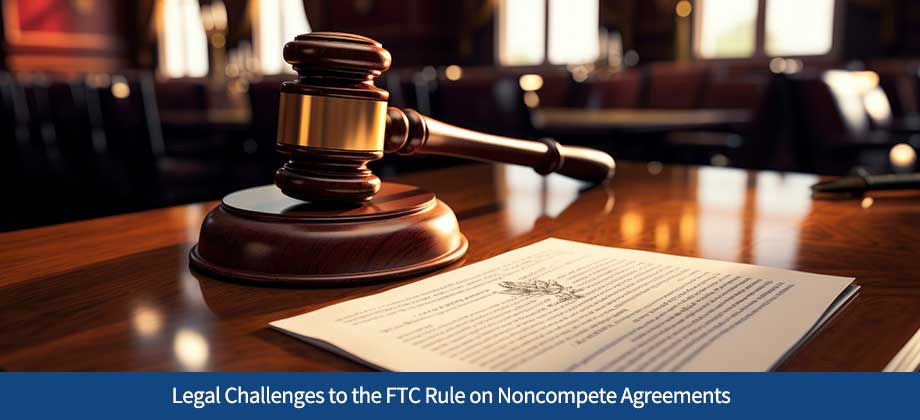Legal Challenges to the FTC Rule on Noncompete Agreements

In April 2024, the Federal Trade Commission (FTC) announced a rule banning noncompetes nationwide, “protecting the fundamental freedom of workers to change jobs, increasing innovation, and fostering new business formation according to the press release. For a huge majority of people, existing noncompetes will no longer be enforceable under this rule (senior executive noncompetes can still be enforced). Additionally, businesses won’t be able to administer new noncompetes for anyone on staff.
Noncompete agreements, for those new to the term, are legal clauses in a contract that prohibit employees from going to work for a competitor after their employment is over. They also prevent employees from disclosing any private company information or secrets to other businesses during or after their employment. It’s estimated that 1 in 5 American workers (roughly 30 million individuals) is subject to a noncompete. The new rule will become effective 120 days after its publication unless a legal challenge delays its implementation.
The FTC’s ban on noncompetes might sound reasonable at first glance, but the National Federation of Independent Business (NFIB) took a different stance recently. They’re challenging the FTC’s final ruling, arguing that the FTC doesn’t have the authority to ban noncompete agreements. An amicus brief in the case Ryan, LLC. v. Federal Trade Commission (FTC) at the U.S. District Court for the Northern District of Texas makes two arguments: First, that “the FTC premised the final rule on a seriously flawed cost-benefit analysis,” and secondly “the FTC’s fallacious and internally inconsistent ‘reasoning’ establishes that the rule is arbitrary and capricious.”
Beth Milito, Executive Director of NFIB’s Small Business Legal Center, had this to say about the ruling: “The FTC’s final rule on non-competes is a textbook example of arbitrary rulemaking. The final rule leaves small businesses with vague conditions that make it difficult for owners to correctly comply. The FTC’s unelected bureaucrats continue to misrepresent the needs of small businesses and the impact the Commission’s flawed policies will have on Main Street. Our amicus corrects the record. We are hopeful that the Court will reject the FTC’s final rule.”
The amicus brief was filed with the National Retail Federation, International Franchise Association, Associated Builders and Contractors, American Hotel & Lodging Association, National Association of Wholesale Distributers, Independent Electrical Contractors Consumer Technology Association, the Home Care Association, the Restaurant Law Center, and U.S. Council for International Business. The US Chamber of Commerce is also expected to pursue a legal challenge to the rule.
Stick with the Financial Pantry, ARF Financial’s informative blog, for the latest news and information on all things small business. And if you find yourself needing additional financing to help grow your business, turn to our experts! We can’t wait to partner with you.
Your privacy is important to us. ARF Financial will never sell or rent your information to any third party. Click here for more information about our privacy policy. Image by freepik

